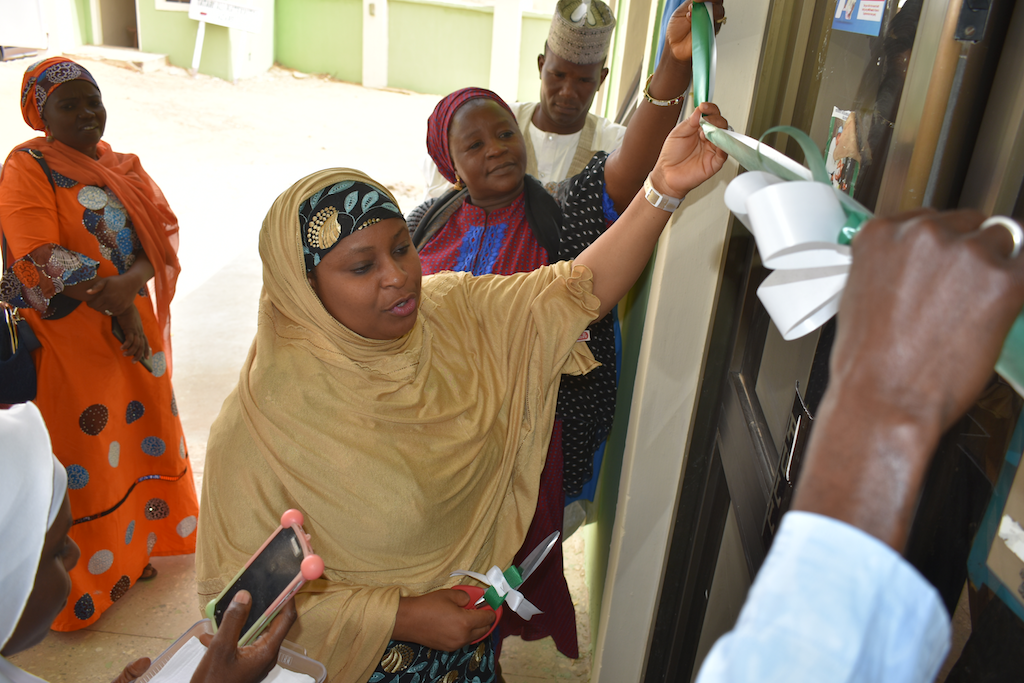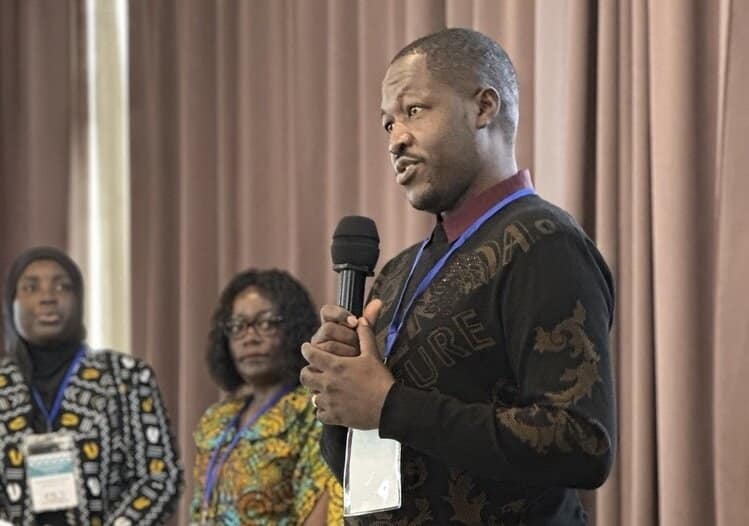Faced with dilapidated health clinics in many regions of Nigeria, women were avoiding the facilities, foregoing the family planning and prenatal care provided inside. So seven years ago, the Johns Hopkins Center for Communication Programs came up with an idea:
What if they could quickly rehab the facilities inside and out, making sure they were fully stocked with contraceptives and other supplies and manned by trained service providers in order to attract more patients to seek family planning and other critical health services? And what if they could get the community to help, to make them partners in the endeavor?
That’s how CCP’s 72-hour clinic makeover was born.
Since then, CCP’s Nigerian Urban Reproductive Health Initiative (NURHI) has performed more than 500 makeovers, transforming rundown and poorly functioning health clinics in a single weekend. And this unique model is now expanding. The Challenge Initiative (TCI), funded by the Bill & Melinda Gates Foundation, the same organization that sponsors NURHI, is now embarking on makeovers in the Nigerian states where it works as well as in Kenya and Uganda and French-speaking West Africa.
“The 72-hour clinic makeover concept was conceived in a little room in one of CCP’s offices in Nigeria and I am glad that a CCP seed sown seven years ago has taken root in Nigeria and now has branches around Africa,” says CCP’s Mojisola Odeku, MD, family planning portfolio director for NURHI. “It’s wonderful to see these transformations replicated beyond Nigeria because they are cost effective and pay dividends immediately.”
Recently, TCI’s Uganda team visited CCP’s project sites in Nigeria to learn firsthand how the makeovers are done. TCI’s West Africa team has translated CCP’s 72-hour Makeover Guide into French and adapted it to be used there.

Community members gather for a ribbon cutting at a clinic in Nigeria’s Bauchi State after a 72-hour Clinic Makeover.
“We are always looking for a way to take our successes and scale them up,” says Susan Krenn, CCP’s executive director. “For others to run with CCP’s 72-hour clinic makeover and adapt it for their contexts is inspiring to see.”
Government-run health facilities throughout Nigeria are often in such poor condition that many Nigerians avoid them. There is also a lack of trust between communities and clinics and many would-be patients seek out less conventional methods of treatment, leaving them without appropriate medical care.
Meanwhile, Nigeria has some of the worst maternal mortality rates in the world: A Nigerian mother dies every 13 minutes.
The 72-hour makeover was designed to repair that trust, helping communities and providers work together to fix what’s wrong. The makeover itself may be quick (beginning on Friday afternoon and wrapping up on Monday), but months of planning and preparation goes into determining what needs fixing and replacing and how it will be accomplished. NURHI prioritizes facilities in areas with a large pool of potential clients and involves the government, service providers and the local communities with every step of the process.
Together, they determine what a clinic needs and develop a plan to make the changes.
Communities may need medical equipment or new waiting rooms or privacy screens. Service providers receive additional training to improve service delivery. Local artisans are engaged to repair tiles or doors or paint walls. None of the makeovers cost more than $1,500 U.S.
Workers may paint or tile or make other physical improvements. Community leaders might cook food for the workers or scrub the windows or do whatever else is needed. Equipment is delivered and installed. All of this over the course of a long weekend.
On Monday, the clinic reopens with a celebration – and a whole new look and feel. And everyone from the service providers to the community members to the patients feel a sense of pride and ownership in the finished product.
“It is amazing that this huge renovation was done within 72 hours, in fact less than 72 hours because you come in here just on Friday and today is Monday and everything is ready,” said of the chiefs in Oyo State in Southwest Nigeria, said as he waited for his improved clinic to open. “We are very happy.”
The impact is felt almost immediately. After one NURHI-led makeover at a health clinic in Kano State in Northwest Nigeria, there was so much demand that the facility now operates on a 24-hour schedule.
In Oyo State, the Akeetan Baale health center saw a 108 percent increase in new family planning adopters in the six months before their February 2017 makeover compared to the six months after. In Kaduna State, the CHC Jaji health center saw a 200 percent increase in new family planning adopters in the six months after their October 2016 makeover. Examples just like there can be found across Nigeria.
“In every clinic we have performed a makeover, visits are up, especially those for family planning services,” says CCP’s Rael Odengo, the Baltimore-based program officer for NURHI. “These makeovers make it easier for people across Nigeria to adopt modern contraception by transforming their local health clinics in a matter of hours. We have learned that you can make real change in a very short period of time.”
It’s not just a physical makeover. It’s also a psychological transformation.
Abimbola Teniola, a 35-year-old civil servant in Nigeria, was recently nursing her baby at one of the clinics that received a makeover. She has certainly noticed a difference and tells other women she encounters about the benefits of family planning and the contraceptive methods offered in the clinic.
“The treatment I received at the health facility was very welcoming and cordial,” she says. “The environment was also very neat and I had privacy, unlike before where you have to see the nurse in the presence of everyone.”




